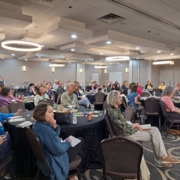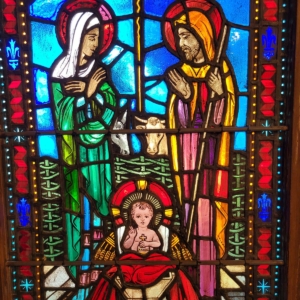“Get Outta My Tribe!”
The first two readings for the Fourth Sunday of Lent, which we will hear next week, remind me of a joke I heard the other day. “I’m trying to convince my dad to get a new hearing aid. He just won’t listen.”
We love to be bad. We refuse to listen to anyone. It’s what we do. What’s more, today, the more someone points out how bad we’ve been, the more we “double down” and become even worse! But why? Why do we constantly make the choice to do the wrong thing?
It’s nothing new. The Old Testament reading from 2 Chronicles 36 starts with, “In those days… the people added infidelity to infidelity, practicing all the abominations of the nations and polluting the Lord’s temple…” Then St. Paul tells the Ephesians in chapter 2 that they, meaning humanity before Christ, “were dead in [their] transgressions.”
In a word, I blame tribalism. Tribalism is more than just being organized into a tribe. It’s a way of life and thought. You naturally hang with people who look like you, who act like you, who speak like you. You feel more comfortable with them, and there is a natural shorthand of thought. You know what your friends and neighbors are going to think, say, or do before they do it. It’s comfortable. It’s lazy.
The point is, the more we act blindly as a member of the tribe, the less we listen to that deep inner voice. The voice God put inside us. The more I turn off my conscience and listen to people inside my bubble, the deeper I dig my trench.
A Little Story
Many years ago, I was in Dresden, Germany, singing as the US invaded Afghanistan after 9/11. There was quite a bit of political tension in northern Germany, as it had the largest ex-pat population of Middle Easterners in Europe. They would work menial and manual labor jobs for pennies on the dollar. They were (and are) hard-working and caring people, very loyal to Germany, but they also still held a love and admiration for their homelands.
One warm afternoon, I was walking down to the river near the opera house and happened onto a family of four: mother, father, and their son and daughter of about 12 and 14, respectively. There was no question they were Americans. The man wore shorts and a tee shirt that read, “America! Love her or leave her!” The wife’s shirt was emblazoned with a picture of a rifle and the words “America First, Last, and Always.” The children’s shirts were just as pro-American as the parents.
Typically, these tee shirts would not cause a second look in Chicago, Kansas City, or Houston. But this is Dresden, Germany, with a very high Middle Eastern population. They stuck out. As I continued to the river, I noticed the start of a large anti-American protest forming. There were at least 500 worked-up people carrying placards and chanting something that ended with the word “America!” and did not sound very friendly. After seeing the protest form, I knew that the American family I’d just passed was about to stroll right into the middle of it. I quickly went back to them.
When I reached the family, I told them of the protest and suggested they continue on a different path. That’s when the unexpected happened. Tribalism at its finest. The father said, “What kind of an American are you? We don’t run and hide. We live in the best country in the world, and we’re damned proud of it.” I tried to reason with them, but it was no use.
Not wanting to be in the middle of a protest, I went and had a cup of coffee in an outdoor café and watched the protest go by. It was loud and raucous. I waited to see if the American family would be foolish enough to wade into the middle of it. Luckily, they were nowhere to be seen.
The next day, I ran into them again, bags in hand and headed for the train station, and as full of as much bravado as the day before. This time it was the mother who said, “If these people don’t see that America is the greatest country in the world, then we don’t want to be here. We’re leaving!” And with that, they hopped on the train to the airport.
Tribalism closes ears. It blinds people’s sight to what God’s will is for them. It makes gods of countries and “influencers.” Tribalism has a bad habit of turning people’s gaze inward, to themselves and their own group, instead of toward people outside and in need. “The Others” almost automatically become “the enemy.” “If they’re not one of us, they must be wrong, bad, evil.”
So, how do we stop tribalism from destroying us? The princes of Judah in 2 Chronicles didn’t manage. They were soon overrun and sent into exile. We do it by listening to that inner voice more than the talking heads and biased chatter. By taking the famous conversation between Jesus and Nicodemus, “For God so loved the worlds that He sent His only Son…” from John 3 to heart. By believing that we are all in this together. That we all need to believe God sent His Son to act as not just a go-between but as someone who reunited us with God’s original will for us. Then, we need to act accordingly. We need to stop beating the drum of our own tribe and start helping those who no one claims. Or better yet, become a people without tribal borders.
Copyright 2024 Ben Bongers
Image: Pixabay















